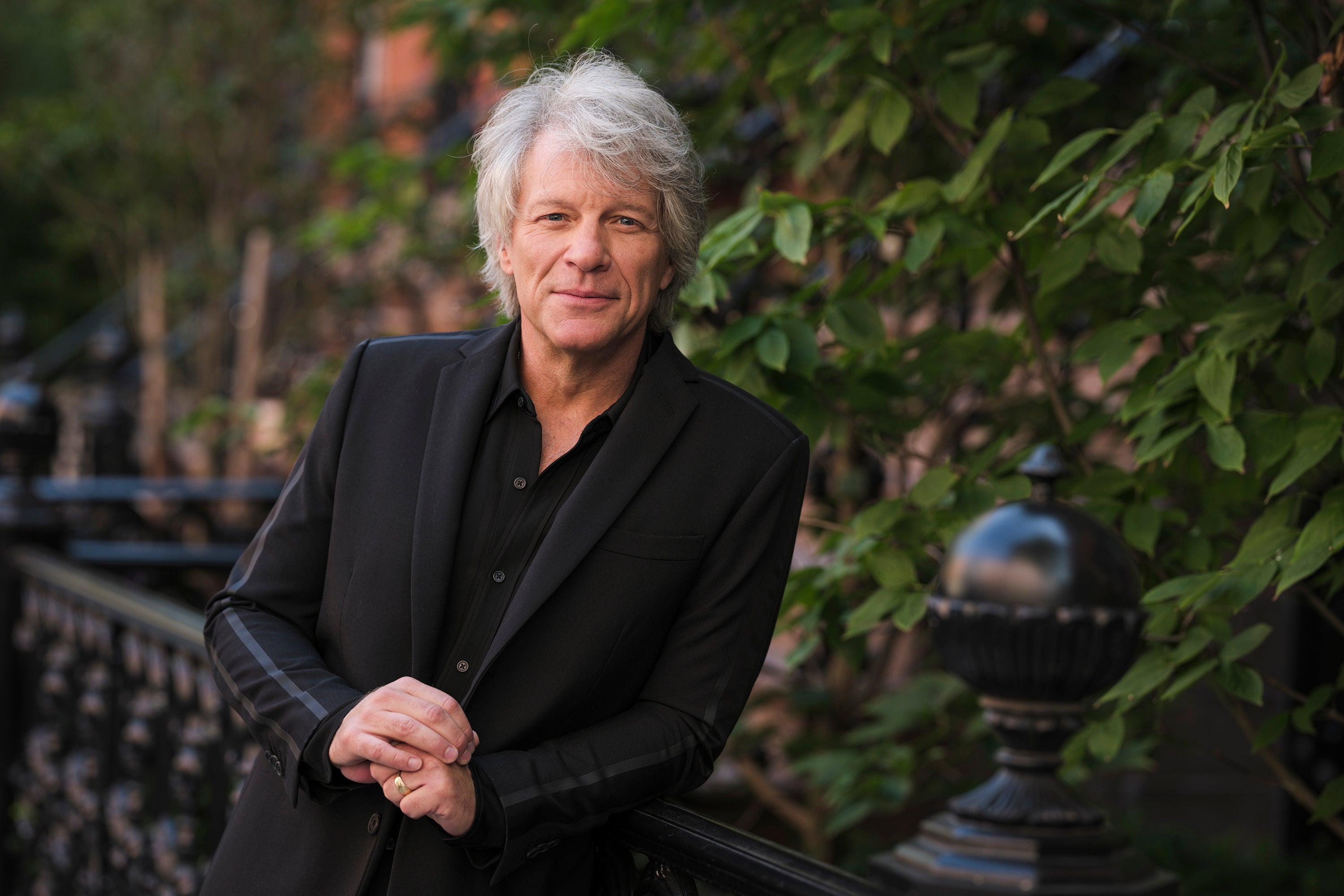The Post That Shook the Internet
It wasn’t a new album. It wasn’t a reunion tour. It wasn’t even a viral performance on late-night TV.
Jon Bon Jovi, the rock legend who once filled stadiums with anthems of resilience and hope, pressed “post” on a short sentence — and the world lit up in chaos.
“If you want people to have kind words when you pass, you should say kind words when you’re alive.”
At first glance, it looks harmless. Wise, even. But in 2025, nothing is harmless. Nothing is neutral. Words can be daggers, and this one sliced deep.
The backlash was immediate, harsh, and relentless. Accusations of hypocrisy. Mockery about his fading fame. Angry retorts that he was taking cheap shots in the wake of Charlie Kirk’s sudden death.
But instead of apologizing or softening his words, Bon Jovi pressed harder.
“And I’ll stand behind this. Be kind, now more than ever.”
In that doubling down, Jon Bon Jovi did more than defend a quote. He ignited a cultural civil war.
Kindness as a Battlefield![]()
How did we arrive at a place where kindness itself could divide a nation?
The irony is bitter. For years, celebrities have been criticized for staying silent in moments of national tension. Yet when Bon Jovi chose to speak, his message — not about politics, not about money, but about kindness — detonated like a bomb.
One side read his words as a sermon of compassion. Another read them as an attack. And in a polarized climate, interpretation is everything.
Some insisted he was targeting Charlie Kirk without naming him. Others saw it as a rebuke to anyone who speaks blunt truth rather than sugarcoated niceties. And still others thought Bon Jovi was simply scolding the world from the safety of his celebrity perch.
The phrase “be kind” should unite us. Instead, it revealed just how allergic we are to being told how to live.
The Shadow of Charlie Kirk![]()
Though Bon Jovi never mentioned Kirk by name, the timing made the connection unavoidable. Kirk’s sudden collapse and death had left the nation reeling. His sharp words in life became the subject of debate in death. Should people honor him regardless of the pain his rhetoric caused? Or should they be honest, even at the funeral?
Into that fragile silence, Bon Jovi’s post landed. To many, it felt like judgment. Like a slap to the grieving. Like a moral lecture disguised as wisdom.
But maybe that’s exactly why it struck such a nerve. Because whether he intended it or not, Bon Jovi forced America to wrestle with the one question no one wants to answer: do we speak truth at the graveside, or do we polish our memories with kindness?
The Internet as Judge and Jury![]()
The reactions on Facebook were a study in fracture.
-
“In a world of Charlie Kirks, be a Bon Jovi.”
-
“Rock legend? Famous yes, legend no.”
-
“If you want respect, you treat people with respect.”
-
“Jesus didn’t always speak kind words — He spoke truth.”
Supporters painted Bon Jovi as a rare celebrity willing to speak uncomfortable truth. Detractors accused him of irony, hypocrisy, and using a tragedy for relevance.
And in the chaos, something remarkable happened: kindness became political.
Why We Hate Being Told to Be Kind![]()
At the heart of the uproar is a paradox: everyone wants to be seen as kind, but no one wants to be told to
Kindness is supposed to be effortless, authentic. But when commanded, it feels like shame. It feels like control. It feels like being silenced. For Bon Jovi’s critics, his words weren’t inspiration — they were indictment.
And yet, those who cheered him heard something entirely different. They heard courage. They heard a challenge to live authentically. They heard a reminder that legacy is written not in tributes after death but in the way we treat people while we’re alive.
Bon Jovi’s Refusal to Retreat
Celebrities usually backtrack when the mob descends. They issue “clarifications.” They claim “context was missing.” They beg forgiveness.
Bon Jovi did none of that. He doubled down with words that were simple, stripped of PR polish, and utterly defiant:
“Be kind, now more than ever.”
No hashtags. No sponsors. No marketing campaign. Just a line in the sand.
That refusal to retreat transformed him from aging rock star into something else entirely: a lightning rod. A man willing to stand in the storm.
Hypocrisy and Humanity
Of course, the internet loves nothing more than a hypocrisy hunt. Critics dragged up stories of Bon Jovi’s past, of moments when he may not have been kind. The message was clear: how dare a flawed man preach kindness?
But that’s the trap. If we wait for perfect messengers, kindness will never be spoken aloud. Maybe it’s precisely because Bon Jovi has stumbled that his plea matters. Maybe kindness is most urgent when it comes from imperfect lips.
What Bon Jovi Exposed
The real scandal isn’t Bon Jovi’s words. It’s our reaction.
If a call for kindness provokes outrage, what does that reveal about us? Maybe we’ve grown so addicted to outrage, so conditioned to fight, that even compassion feels like an attack.
Bon Jovi didn’t cancel kindness. He canceled our excuses for ignoring it.
A Nation in the Mirror
Bon Jovi’s stand was never just about Charlie Kirk, or celebrity culture, or rock stars on Facebook. It was about us. About whether we can handle the mirror he held up.
Do we live in a way that invites kind words at our funeral? Or do we expect forgiveness after death for the cruelty we refused to abandon in life?
That question haunts because it is universal. Strip away the politics, the fame, the anger, and you are left with something raw: legacy.
The Final Encore
Jon Bon Jovi didn’t sing. He didn’t play guitar. He didn’t sell tickets. He simply wrote words — and in doing so, he reminded us that sometimes the quietest notes echo the loudest.
He won’t back down. And whether you love him or loathe him, you can’t ignore the truth that kindness, once a safe cliché, has now become dangerous.
And maybe, just maybe, that’s exactly what America needs to hear.
The Three Secret Weapons Queen Elizabeth Left Kate — And Why Camilla Should Be Worried


When Queen Elizabeth II passed away, she did not simply leave behind a crown, a legacy, and a lifetime of service. She also left behind a carefully crafted plan — one designed to protect the monarchy, and one woman in particular: Catherine, Princess of Wales.
Those who knew the Queen best say she had a keen instinct for reading people. She understood ambition when she saw it. And she had no illusions about the challenges Kate would face, especially from Queen Camilla. The Queen, ever the strategist, made sure Kate would not face them unprepared.
First Weapon: A Will That Spoke Volumes
In the Queen’s private will — a document shrouded in secrecy and guarded by tradition — she left half of her personal jewelry collection to Kate and Princess Charlotte.
To outsiders, it might appear to be nothing more than a generous family bequest. But to the royal family, jewelry is more than ornament. Each piece carries history — tiaras worn at state banquets, brooches gifted by foreign monarchs, pearls passed down through generations. These are not just treasures; they are symbols of status and legitimacy.
By giving such an inheritance to Kate and her daughter, the Queen was making a statement. This was not a passing nod of approval — it was a seal of recognition, declaring Kate as a future queen in her own right. The gems, glittering under palace lights, would remind anyone watching that Kate held not just beauty, but the Queen’s unwavering trust.
Second Weapon: The Shield of Princess Anne
The Queen understood something few dared to admit: King Charles, for all his experience, could be swayed, and Camilla’s ambitions were not easily checked.
So, she turned to the one royal who had never bent under pressure — Princess Anne. Known for her unshakable sense of duty, steel-edged discipline, and quiet authority, Anne has long been the monarchy’s workhorse. The Queen entrusted her with a mission: to protect Kate’s position in the royal family.
That decision proved prophetic. When Kate faced her cancer diagnosis and stepped back from public life, it was Anne who stepped forward, taking on engagements, representing the Crown with grace and gravitas. Her presence was more than ceremonial — it was a silent warning to Camilla that Kate was not alone.
Camilla may be queen by title, but she knows Anne’s standing in the family is unassailable. To cross Anne is to invite a storm. And so, under Anne’s watchful guard, Kate had the space and peace she needed to recover — a protection the Queen herself might have given, had she still been alive.
Third Weapon: Securing William’s Future
Perhaps the most powerful move of all came long before the Queen’s death. Quietly, firmly, she ensured that William’s status as the heir apparent was beyond dispute.
Royal watchers will recall the whispers over the years — speculation about succession, the “what ifs” that cling to any royal family. But Elizabeth made it clear: no matter how many children Charles has, no matter the politics swirling behind palace walls, William is the next King of England.
This was more than a constitutional safeguard. It was an emotional anchor for Kate. Knowing that her husband’s place was secure meant that her children’s future — and her own — could not be undermined by court intrigue. It closed the door on any long-game ambitions from Camilla’s side of the family.
A Legacy of Strength
Some have called Kate “the new Diana.” Others see her as a modern royal, blending tradition with quiet confidence. But in truth, she is her own figure — one whose greatest strength may come from those who believed in her most.
The Queen’s “three weapons” were not acts of favoritism. They were acts of foresight. Elizabeth knew that in the shifting sands of the monarchy, protection is not always about speeches or decrees. Sometimes, it’s about a necklace that carries history. Sometimes, it’s about the right person standing beside you in the storm. And sometimes, it’s about closing the door on doubt before it can ever creep in.
Why Camilla Should Take Note
Camilla has spent decades navigating her way into the heart of the monarchy. She has influence, she has position — but she does not have what the Queen gave Kate: her blessing, her legacy, and her defenders.
For years, the question lingered — could Kate stand up to Camilla? Now, the answer seems clearer than ever. Not only can she, but she is doing so with the quiet backing of the late Queen’s design.
And in the world of royalty, quiet power often lasts the longest.














